Romas Lileikis is not your typical president. He wears jeans, grows a beard, and when giving a talk at a symposium last Sunday, he was joined not by buttoned-down politicians but poets, artists, curators and an audience mostly made up of college students who came to see one of his two films in the New Taipei City Film Festival (新北市電影節) taking place now in Banciao District (板橋區).
And yes, the president is also a filmmaker. He composes music too, and always uses the language of a poet when speaking of the Republic of Uzupis he helped to create 17 years ago.
“Uzupis is based on paradoxes. Why? Because without paradoxes, the world is flat,” Lileikis says.
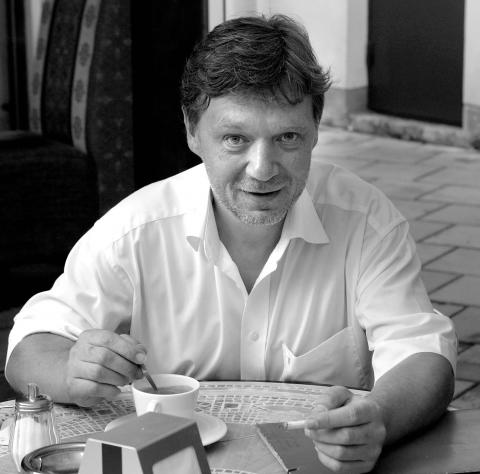
Photo courtesy of Taiwan Film and Cultural Association
BIRTH OF A REPUBLIC
Situated in the Lithuanian capital of Vilnius, Uzupis — which means beyond the river — is an ancient district that remained cut off from the city’s old town until the first bridges were built across the Vilnia River in the 16th century, a time when its inhabitants were mostly Jewish. By the end of the two world wars, most of the district’s population had vanished, having been exterminated or exiled. Houses left empty were later taken over by “the lowest elements of the society.”
In 1990s, a small influx of artists, writers and other bohemian types came to search for cheap property and a nonconformist lifestyle in the then run-down neighborhood. At first, they were met with suspicion from the long-time dwellers in what was considered the most criminal part of the town.
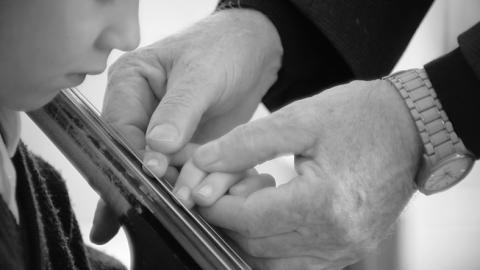
Photo courtesy of Taiwan Film and Cultural Association
“It was a dangerous place to be after dark with men carrying knives. They looked at us from far, far away,” Lileikis recalls.
Because of the city council’s chronic neglect, a sense of destruction and decay pervaded the area until Uzupis’ eccentric newcomers decided that the only way to “overcome death is through creativity.” Thus on April Fool’s Day in 1997, the Republic of Uzupis was born.
The founding of the micro-nation occurred in the aftermath of Lithuania’s declaration of independence from the Soviet Union in 1990. It was a time when the country was trying to rediscover its national identity and rid itself of the Soviet Union’s “ideological control.” In the cultural sphere, the newly found freedom and fledging democratic movement were often contested, imaged and played out with devices like absurdity, irony and humor. For example, in 1995, a group of Lithuanian artists and intellectuals erected a statue of American musical iconoclast and anti-establishment figure Frank Zappa in Vilnius, with the support from creative professionals living in the bohemian quarter of Uzupis.
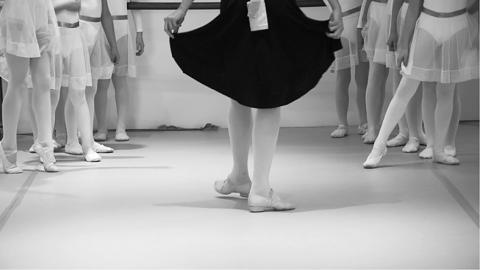
Photo courtesy of Taiwan Film and Cultural Association
“It was a time when we tried to find lots of solutions because the values were changing. You must understand your way of living to form your way of thinking. What does it mean to be independent? It is a huge responsibility,” Lileikis says.
The solution for Lileikis and others was to create a nation that is “open to the world” and whose core value is responsibility that comes with freedom. Citizenship to the republic is not limited to its 7,000 residents but also extends to those who share the spiritual ideas, values and beliefs of Uzupis.
“There is no need for any kind of confirmation, paperwork or stamp [to become a citizen]. It’s simply enough to say ‘I am,’” the president asserts.
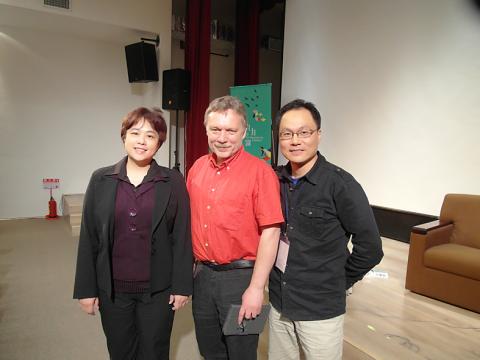
Photo courtesy of Taiwan Film and Cultural Association
Judging by appearance, Uzupis has all the attributes of a nation. There is a national anthem, a government with several ministers, four flags — one for each season — and a constitution co-written by Lileikis.
Regarded by the president as “a system of values,” the 41-article constitution of Uzupis has been translated into many languages, and the copies can be found affixed to a wall on the district’s main street. Some of the articles claim idiosyncratic rights such as “everyone has the right to be idle” and “everyone has the right to be misunderstood.” Others are free-spirited like “no one has the right to have a design on eternity” or “everyone has the right to not to be afraid.”
The republic also has its own calendar of traditions and holidays, some of which are uniquely Uzupian. One of the examples is the New Year’s celebration. Residents welcome the coming of the new year on spring equinox, not in the depth of winter, by throwing used items and old diaries into a fire so as to “escape one’s old stereotypes and cliches and make room for new stereotypes and cliches for the year to come,” Lileikis explains.
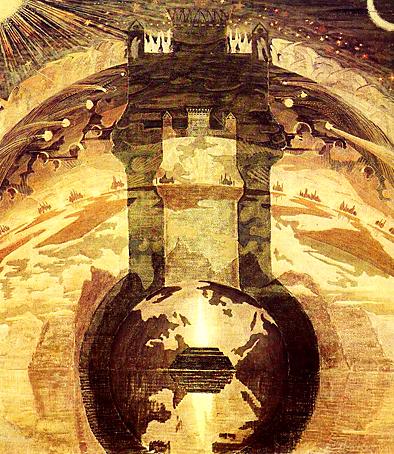
Photo courtesy of Taiwan Film and Cultural Association
As for the national-security concerns, the enclave had a 12-man army for the first few years. It was subsequently disbanded because the existence of force of any kind contradicts Uzupis’ opposition to aggression, be it physical, mental, external or internal.
President Lileikis confesses that the thinking behind the republic is closely connected with poetry. And the founding of the micro-nation by dreamers and idealists indeed sounds like an artwork when Lileikis remarks that “everyone can understand Uzupis in his or her own way.”
AN ARTIST’S COSMOS
As an artist, Lileikis often sheds light on creativity through his works. His latest film MAAT is composed of elegant close-ups of people engaging in different artistic and creative endeavors, a work made to “overcome the ego of an artist,” as the filmmaker puts it. More intriguingly, The Shadow of Heaven (2008) reveals the artistic world of Mikalojus Konstantinas Ciurlionis (1875 to 1911), a Lithuanian painter and composer who, during his short life, managed to leave a creative legacy that renders him the most influential figure in the modern Lithuanian culture.
Lileikis says that Ciurlionis, who he is related to, has had great influence on his way of understanding the world, and that Ciurlionis’ art provides a “spiritual resistance” to him and his contemporaries. According to Lileikis, the idea of the cosmos takes central stage in Ciurlionis’ paintings, and he “always searches for possibilities to unite this world, to find the source of it.”
Indeed, the description of Uzupis by Lileikis as a “small cosmos, not only part of Vilnius and Lithuania, but a small piece of universe” echoes the motif of the creation and order of the universe Ciurlionis was preoccupied with in his paintings. And it is perhaps not a sheer coincidence that the late legend’s favored theme on the world of mythological and biblical images finds an incarnation in the statue of an angel that took Uzupis’s penniless artists six years to build and erect in the district’s main square and is described by Lileikis as “a symbol of connection between the sky and the earth.”
It is true that the existence of Uzupis is a manifestation of artistic musings, but the nearly two-decade long undertaking also directly affects social and political change, spurred not by “money, but ideas,” or an alternative mode of thinking and existence.
So comes the inevitable question: What happens when the system of values and thinking from the outside world clashes with that of Uzupis?
To Lileikis, the answer lies in the recognition that the world itself is made up of contradictions and paradoxes, and that through dialogues, people are able to make mistakes — a right protected by the republic’s constitution — communicate, “meet each other and be together.” It is through communication that the Lithuanian authorities have changed from being “in a long, long, long silence” when first confronted with the independence movement of Uzupis into signing a treaty that respects its constitution, as it is believed by Lileikis.
“You must live in such a way that no one is afraid of anyone else,” the artist muses.
When asked what suggestion he can give to Taiwan, a nation also not internationally recognized and full of contradictions, Lileikis the president didn’t hesitate with his answer.
“To be open, and to be not afraid of being open,” he says.

On April 26, The Lancet published a letter from two doctors at Taichung-based China Medical University Hospital (CMUH) warning that “Taiwan’s Health Care System is on the Brink of Collapse.” The authors said that “Years of policy inaction and mismanagement of resources have led to the National Health Insurance system operating under unsustainable conditions.” The pushback was immediate. Errors in the paper were quickly identified and publicized, to discredit the authors (the hospital apologized). CNA reported that CMUH said the letter described Taiwan in 2021 as having 62 nurses per 10,000 people, when the correct number was 78 nurses per 10,000

As we live longer, our risk of cognitive impairment is increasing. How can we delay the onset of symptoms? Do we have to give up every indulgence or can small changes make a difference? We asked neurologists for tips on how to keep our brains healthy for life. TAKE CARE OF YOUR HEALTH “All of the sensible things that apply to bodily health apply to brain health,” says Suzanne O’Sullivan, a consultant in neurology at the National Hospital for Neurology and Neurosurgery in London, and the author of The Age of Diagnosis. “When you’re 20, you can get away with absolute

May 5 to May 11 What started out as friction between Taiwanese students at Taichung First High School and a Japanese head cook escalated dramatically over the first two weeks of May 1927. It began on April 30 when the cook’s wife knew that lotus starch used in that night’s dinner had rat feces in it, but failed to inform staff until the meal was already prepared. The students believed that her silence was intentional, and filed a complaint. The school’s Japanese administrators sided with the cook’s family, dismissing the students as troublemakers and clamping down on their freedoms — with

As Donald Trump’s executive order in March led to the shuttering of Voice of America (VOA) — the global broadcaster whose roots date back to the fight against Nazi propaganda — he quickly attracted support from figures not used to aligning themselves with any US administration. Trump had ordered the US Agency for Global Media, the federal agency that funds VOA and other groups promoting independent journalism overseas, to be “eliminated to the maximum extent consistent with applicable law.” The decision suddenly halted programming in 49 languages to more than 425 million people. In Moscow, Margarita Simonyan, the hardline editor-in-chief of the